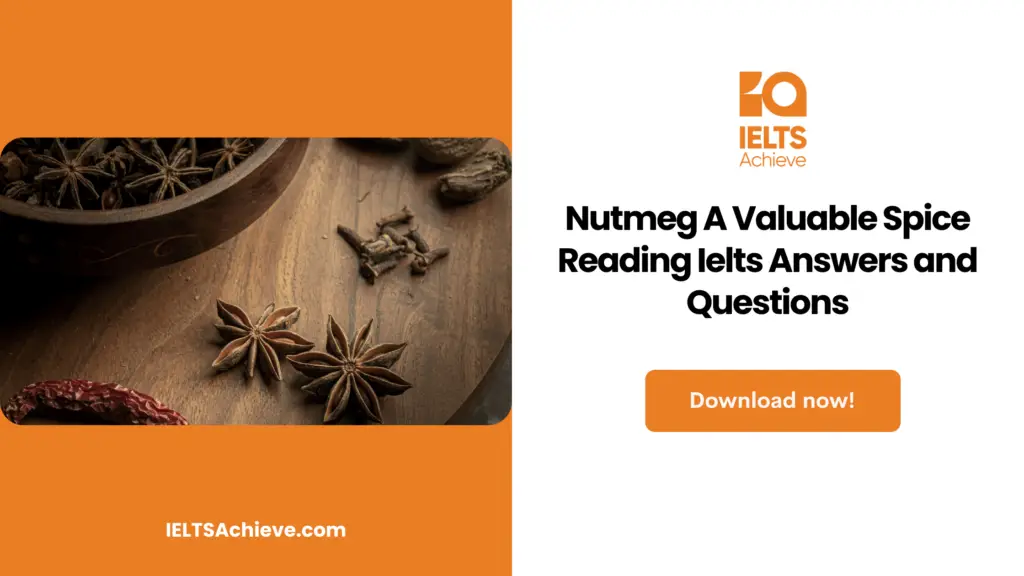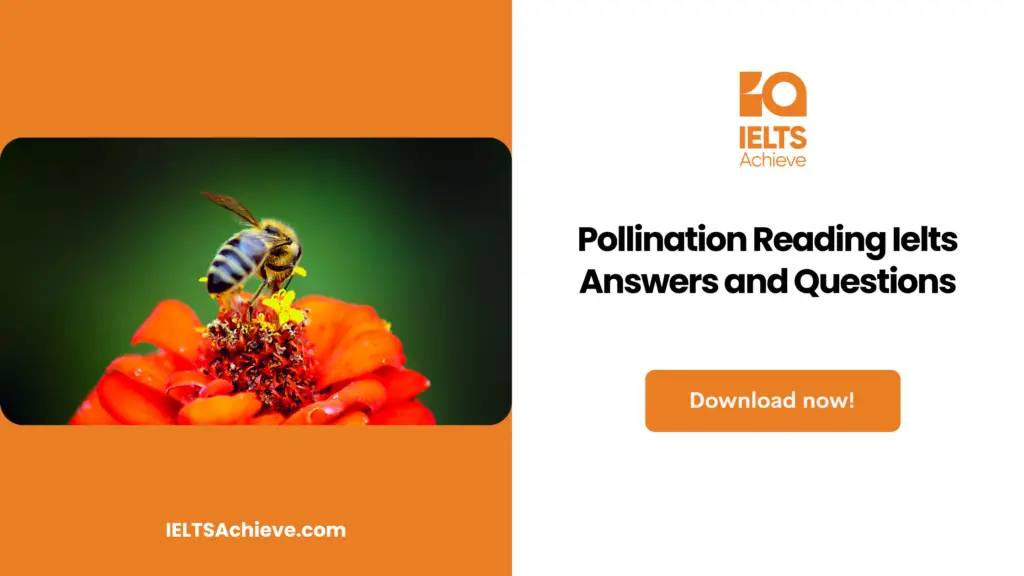The Blog post contains the following IELTS Reading Questions:
- IELTS reading Note completion
- IELTS reading True/false/not given
- IELTS reading Table completion
Stay informed and prepared for success – Explore our comprehensive Reading Test Info page to get valuable insights, exam format details, and expert tips for mastering the IELTS Reading section.
IELTS reading passage – Nutmeg – A Valuable Spice

Nutmeg – A Valuable Spice
An extensive evergreen tree native to Southeast Asia, is a nutmeg tree, Myristica fragrans. It grew only in one area in the globe, a little group of islands in the Banda Sea, the Moluccas or the Spice Islands in northeastern Indonesia. The tree has thick branches with thick leaves of dense, dark green oval leaves, and delivers little, yellow, bell-shaped flowers and light yellow pear-shaped fruits. The fruit is attached to a fleshy husk. Once the fruit is ripe, the husk divides into two parts along a ridge along the length of the fruit. Inside is a purple-brown glossy seed, 2-3 cm long and 2 cm across, covered by a lacy red or crimson sheath called ‘aril’. These are the two spice sources of nutmeg and spices, the former being produced from dried seeds and the latter from rice.
Nutmeg was a very valuable and valuable ingredient in European cuisine in the Middle Ages and was used as a flavoring, medicinal and preservative agent. Throughout this period, the Arabs were the exclusive importers of spices to Europe. They sold nutmeg to merchants in Venice at more costs, but they never disclosed the accurate location of the source of these most valuable products. The domination of the Arabian-Venetian trade ultimately came to an end in 1512, when the Portuguese reached the Banda Islands and started to exploit its special resources.
Always at risk of rivalry with neighboring Spain, the Portuguese started to subcontract their supply of spices to Dutch merchants. Profits started to flow into the Netherlands, and the Dutch merchant fleet quickly expanded into one of the biggest in the world. The Dutch quietly acquired control of the shipping and trade of most of the spices in northern Europe. Then, in 1580, Portugal slipped under Spanish rule, and by the end of the 16th century, the Dutch had expelled themselves from the market. As the prices of pepper, nutmeg, and other spices soared across Europe, they determined to fight back.
In 1602, Dutch merchants launched VOC, a trading company known as the Dutch East India Company. By 1617, VOC was the richest trading activity in the world. With a private army of 30,000 men and a navy of 200 ships, it had 50,000 personnel worldwide. Meantime, lots of people across Europe were dying of the plague, a highly infectious and deadly illness. Doctors were pessimistic about a way to prevent the spread of the disease, and they determined to heal nutmeg. Everyone loved nutmeg and many were ready to spend any money to get it. Nutmeg, accepted for a few pennies in Indonesia, sold for 68,000 times more than its actual price on the streets of London. The shortage was the only problem. That is where the Dutch got their chance.
The Banda Islands were led by local sultans who demanded maintaining a neutral trade policy toward foreign forces. This permitted them to avoid the existence of Portuguese or Spanish troops on their soil, but this did not protect them from other invaders. In 1621, the Dutch came and captured it. Once under Pandas’ control, the Dutch set out to secure their new investment. They piled all the nutmeg production in a few smoothly protected places and uprooted and destroyed the trees outside the plantation zones. Those caught growing nutmeg seedlings or taking seeds without valid authority were harshly punished. In addition, all the shipped nutmeg was wrapped with lime, leaving no possibility of leaving a fertile seed island that could be grown elsewhere. There was only one barrier to Dutch domination. One of the Banda Islands, a sliver of land called Run, 3 km long and less than 1 km wide, was under British control. After decades of battling for control of this small island, the Dutch and British arrived at a compromise in 1667 called the Treaty of Preta. In an effort to maintain their grip on each nutmeg-producing island, the Dutch presented a trade that if the British gave them a run island, they would offer Britain the farthest and least valuable island in North America. The British agreed. That other island is Manhattan, which is why New Amsterdam evolved into New York. The Dutch now had a monopoly on the nutmeg trade, which would stay for another century.
Then, in 1770, a Frenchman called Pierre Poivre successfully smuggled nutmeg to the island of Mauritius off the coast of Africa. Some of these were later shipped to the Caribbean, where they thrived, particularly on the island of Grenada. Next, in 1778, a volcanic explosion in the Banda area caused a tsunami that destroyed half the nutmeg groves. Ultimately, in 1809, the British came back to Indonesia and forcibly settled in the Banda Islands. They came back to the islands to the Dutch in 1817, but not before planting hundreds of nutmeg seedlings in orchards in many places across South Asia. The Dutch nutmeg monopoly was finished.
Today, nutmeg is raised in Indonesia, the Caribbean, India, Malaysia, Papua New Guinea, and Sri Lanka, and world nut production is calculated to average 10,000 to 12,000 tons per year.
Unlock your full potential in the IELTS Reading section – Visit our IELTS Reading Practice Question Answer page now!
Recommended Questions:
Renewable Energy IELTS Reading Question with Answer
Nutmeg a valuable spice IELTS reading questions
Question (1 – 5)
Complete the notes below.
Write NO MORE THAN TWO WORDS from the passage for each answer.
- Nutmeg grew only in one place in the world, until 1 ________ century
- The Nutmeg tree has thick branches with
– thick leaves of dense,
– dark green 2 ________ leaves, and
– delivers little,
– yellow,
– bell-shaped flowers and
– light yellow
3 ___________ fruits. The two spice sources are produced from 4 __________ and the latter from 5 ____________
Boost your performance in Summary, Notes, Table, and Flowchart Completion tasks. Click here to explore our detailed guide and learn how to effectively complete summaries, notes, tables, and flowcharts in the IELTS Reading section.
Question (6 – 10)
Do the following statements agree with the information given in the reading passage?
Write
TRUE if the statement agrees with the information
FALSE if the statement contradicts the information
NOT GIVEN if there is no information on this in the passage
6. Nutmeg was not very valuable in European cuisine in the Middle times.
7. The Arabs were the exclusive importers of spices to Europe.
8. Portuguese started to subcontract their supply of spices to Dutch merchants.
9. With a private army of 20,000 men and a navy of 300 ships, it had 50,000 personnel worldwide.
10. Dutch merchants launched VOC in 1602, which is the first trading firm in the world.
Enhance your skills in identifying information as True, False, or Not Given. Click here to discover expert strategies and techniques for mastering this question type in the IELTS Reading section.
Question (11 – 15)
Complete the table below.
Choose NO MORE THAN THREE WORDS from the reading passage for each answer.
| Year | Events |
| 1617 | VOC was the richest 11 ______ activity in the world |
| 12 __________ | After decades of battling for control of this small island, the Dutch and British arrived at a compromise called the Treaty of Preta |
| 1770 | A Frenchman called 13 ________successfully smuggled nutmeg to the island of Mauritius off the coast of Africa. |
| 14 ___________ | The British came back to 15 ________ and forcibly settled in the Banda Islands. |
Boost your performance in Summary, Notes, Table, and Flowchart Completion tasks. Click here to explore our detailed guide and learn how to effectively complete summaries, notes, tables, and flowcharts in the IELTS Reading section.
Unlock your full potential in the IELTS Reading section – Visit our IELTS Reading Practice Question Answer page now!
Recommended Questions:
Renewable Energy IELTS Reading Question with Answer
Nutmeg a valuable spice IELTS reading answers
1. 18th
2. oval
3. pear-shape
4. Dried seeds
5. rice
6. False
7. True
8. True
9. False
10. Not given
11. trading
12. 1667
13. Pierre Poivre
14. 1809
15. Indonesia

We hope you found this post useful in helping you to study for the IELTS Test. If you have any questions please let us know in the comments below or on the Facebook page.
The best way to keep up to date with posts like this is to like us on Facebook, then follow us on Instagram and Pinterest. If you need help preparing for the IELTS Test, join the IELTS Achieve Academy and see how we can assist you to achieve your desired band score. We offer an essay correction service, mock exams and online courses.

